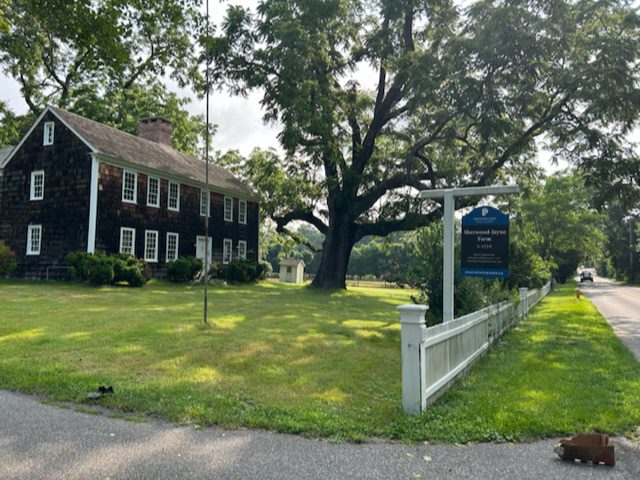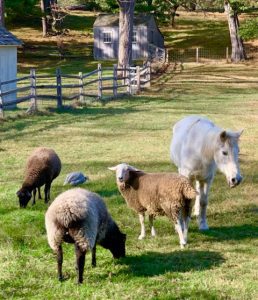Animals to leave Sherwood-Jayne Farm in East Setauket

By Mallie Jane Kim
East Setauket’s historic Sherwood-Jayne Farm will bid farewell to its grazing animals this summer as nonprofit Preservation Long Island seeks to focus its programming to align closer with its mission.
“The animals serve as a visual respite for people on the road, but they don’t really connect the property to what we do,” said Alexandra Wolfe, executive director of PLI, an organization that works to preserve the cultural heritage of the region by preserving historic buildings and using them to engage and inform the public. “We have to think about how we use the Sherwood-Jayne property in ways that are more education-based and talk about history in ways that are more focused on Setauket and Long Island.”

Going forward, Wolfe said, the organization wants to engage the community with history — more than just maintaining small museums or a beautiful farm tableau. “We want to think about interpretation as a very interactive experience,” she said. “Try not to just tell the public about history, but get them to interact with the property.”
But the property’s caretaker and some community members are upset about the change.
“What they’re doing is ruthless and insensitive,” said caretaker Susanna Gatz, a doula who coaches and supports women through childbirth, and who has lived in the farm’s carriage house apartment for eight years, managing the property and the animals.
Gatz said she is sad both to say goodbye to the animals and to lose her home. PLI hopes to install an employee in the carriage house, according to Wolfe, someone who can represent the society and the house’s history while keeping an eye on the property.
The farm hosts an aging white pony Snowball — some 40 years old — and four sheep in the fields on Old Post Road next to the 18th century farmhouse, all managed by Gatz, whose goats and chickens also live on the property.
The current flock of sheep was established in 1933 by Howard Sherwood, founder of the organization that later became PLI, according to information in a virtual tour of the property available on the nonprofit’s website. The tour text explains the organization has been maintaining the flock “as a tribute to Sherwood and to preserve the working nature of the farmstead.”
PLI asked Gatz to discontinue the breeding program about three years ago.
Gatz, who mows, mends fences and liaises with the community, calls the work “heart led” for the amount of time, energy and care she puts into it. Gatz is currently nursing a sheep back to health from injuries it sustained on an unsanctioned romp in the woods, and she looks out for the nearly deaf-and-blind Snowball, giving her the extra care she needs, like approaching upwind so she can smell Gatz is coming.
Snowball may not survive a move, according to Gatz, and the sheep were born on the farm. “My wish would be for the animals to live out their lives in the place they know best,” she said.
Longtime neighbor of the farm, Nancy Trump, believes getting rid of the animals is a loss to the community. “It’s heartbreaking,” she said. “They represent a part of society that’s just dwindling away.”
Trump passes the farm at least twice a day, and she brings her grandchildren to greet the animals and take pictures of them as the seasons change. “I don’t know how you have a farm without the animals,” she said.
Gatz agreed. People stop by often to watch the animals graze, she said. A bus full of children passes by daily during the school year, honking while the children wave out the window. “I could set my watch to it,” Gatz said. “It was really cute.”
Other passersby have expressed concern about the animals, in particular the ancient — in pony years — Snowball, who has lost most of her teeth, causing her to drool and her tongue to loll out. According to Wolfe, PLI hears from citizens upset about the pony’s condition.
“It’s not that she’s sick or neglected,” Wolfe said, noting that Gatz takes excellent care of the pony. “Things like that become problematic. People who don’t understand call, and you have to explain.”
Wolfe added that the animals bring in extra liability, as well, especially with people who may not stay on the outside of the fence.
She said she hopes to finalize the animals’ new homes by the end of the month, and she is dedicated to finding good placements for Snowball and the sheep. “I want to make sure they are cared for,” she said, adding that she’s careful to vet good Samaritans who aren’t prepared for the undertaking of farm animals. “I want to make sure that whatever life they have left, there is quality of life.”
The Sherwood-Jayne House is open for public visits on Saturdays this summer, and the grounds, including nature trails around the property, are open to visitors year round from dawn until dusk.






